Catalan declaration of independence
| Declaration of independence of Catalonia | |
|---|---|
 Page 1 of the Declaration | |
| Presented | 10 October 2017 |
| Ratified | 27 October 2017 |
| Date effective | Not effective |
| Repealed | Effectively unenforceable under the Article 155 of Spanish Constitution |
| Signatories | 72 of the 135 members of the Parliament of Catalonia |
| Purpose | Unilateral declaration of independence of Catalonia as a sovereign republic from Spain |
The Catalan declaration of independence (Catalan: Declaració d'independència de Catalunya; Spanish: Declaración de independencia de Cataluña) was a resolution that was passed by the Parliament of Catalonia on 27 October 2017, which declared the independence of Catalonia from Spain and the founding of an independent Catalan Republic. The declaration did not receive recognition from the international community.
On 10 October, in the aftermath of the 1 October 2017 Catalan independence referendum, a document establishing Catalonia as an independent republic was signed by the members of Catalonia's pro-independence parliamentary majority.[1][2][3] The same document was voted for on 27 October by a majority of 70 out of 135 MPs in a plenary session (10 voted against, 2 abstained and 53 had left the Parliament before the voting as a sign of protest).[4]
Fifty-three MPs from the opposition refused to be present during the 27 October voting, after the legal services of the Catalan Parliament advised that the voting could not take place as the law on which it was based had been suspended by the Spanish Constitutional Court.[5][6]
A few hours later, Prime Minister Mariano Rajoy of Spain dismissed Catalan President Carles Puigdemont and his cabinet, and called for fresh Catalan elections on 21 December 2017.[7] The Deputy Prime Minister of Spain Soraya Sáenz de Santamaría was assigned to be the acting president of Catalonia until the December elections.[8]
Timeline
10 October: Signing and suspension
Puigdemont's address
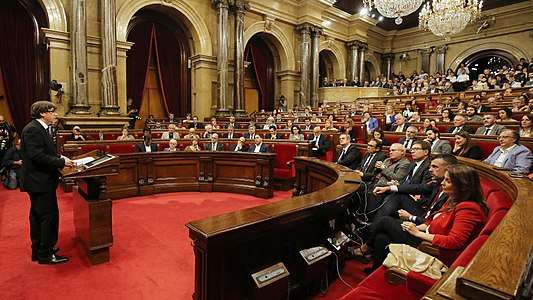
.jpg)
The Law on the Referendum on Self-determination of Catalonia contained the provision that, in case of an outcome in favour of independence, independence was to be declared within 48 hours after all votes were counted. Catalan President Carles Puigdemont confirmed this on October 3 during an exclusive interview with the BBC, saying "we are going to declare independence 48 hours after all official results are counted".[9] Final results were published by the Catalan government on October 6,[10] and Puigdemont announced he would formally address the Parliament on October 10.
Puigdemont was widely expected to declare the independence of Catalonia, which led to worldwide coverage of the parliament session.
After saying that he considered the referendum valid and binding, Puigdemont chose to use the wording "I assume the mandate of the people for Catalonia to become an independent state in the shape of a republic", before adding that he would "ask Parliament to suspend the effects of the declaration of independence so that in the coming weeks we can undertake a dialogue".

The speech left observers bewildered as they struggled to understand whether Puigdemont had just declared independence.[11][12] While some commentators stated that independence had just been declared and put on hold,[13][14] others stated that the declaration of independence had been postponed.[2][15][16][17]
After Puigdemont's speech, a document titled "Declaration from the representatives of Catalonia" declaring Catalonia's independence was signed publicly[18] by the members of parliament of the pro-independence political parties in the auditorium of the Parliament. The document, titled "Declaration from the representatives of Catalonia", sought to establish Catalonia as an independent state, and called on the international community to recognize it. It was read publicly, but it was not voted or published on the Catalan government's official journal.[19]
Spanish government's reaction
The immediate reaction from the Spanish government was that "it was inadmissible to declare independence implicitly and suspend it explicitly". Minister of Justice Rafael Catalá called it a "non-declaration of independence".[20]
Spanish Prime Minister Mariano Rajoy gave a short news conference on the following day, giving Puigdemont five days to confirm whether he had declared Catalonia’s independence or not.[21] Were the answer to be affirmative, the document provided another deadline ending on Thursday, October 19, allowing for Catalan authorities to rectify and prevent the application of Section 155 of the Spanish Constitution, which would authorise Madrid to temporarily take over Catalonia’s internal affairs.
According to Spain's Minister of Foreign Affairs Alfonso Dastis, the written declaration was legally void, as it was not voted and it was signed outside of a parliamentary session.[22]
27 October: Unilateral declaration of independence

On 27 October 2017, a resolution based on the "Declaration of the representatives of Catalonia" declaring the independence of Catalonia was voted in the Parliament and was approved with 70 votes in favor, 10 against, and 2 blank votes.[23][24] Fifty-three MPs from the opposition refused to be present during the voting after the legal services of the Catalan Parliament advised that the voting could not take place, as the law on which it was based had been suspended by the Spanish Constitutional Court.[6] The two pro-independence parties, JxSí and CUP, had 72 seats, and the vote in favour of independence obtained 70.[25]
30–31 October: Suspending declaration of independence
On 30 October, Parliament Speaker Carme Forcadell called off a parliamentary meeting scheduled for the next day because the chamber "had been dissolved", thus acknowledging Mariano Rajoy's order.[26] Later that day, it transpired that Puigdemont and part of his dismissed cabinet had fled to Belgium in a move to avoid action from the Spanish judiciary,[27][28] as the Spanish Attorney General José Manuel Maza announced a criminal complaint against them for rebellion, sedition and embezzlement.[29][30] Concurrently, lack of civil unrest and work resuming as normal throughout Catalonia showed signs that direct rule from Madrid had taken hold, with Spanish authorities reasserting administrative control over Catalan territory with little resistance.[31][32]
By 31 October, the declaration of independence was fully suspended by the Constitutional Court of Spain and the dismissed Catalan government accepted the elections proposed by Mariano Rajoy.[33] Puigdemont and part of his cabinet fled to Belgium in a self-imposed exile to avoid being prosecuted by the Spanish judiciary,[27][32] having been formally accused of rebellion, sedition and embezzlement by the Spanish Attorney General.[29][30]
Consequences
On 2 November, the judge Carmen Lamela of the Spanish National Court ordered that eight members of the deposed Catalan government including the ex-vice-president Oriol Junqueras be remanded in custody without bail. Additionally, Santi Vila, who was the Business Minister that resigned over the unilateral declaration of independence, was granted a €50,000 bail. The prosecution requested issuing European Arrest Warrants for Puigdemont and four other members who left Catalonia for Brussels shortly after the declaration.[34][35]
The Catalan elections were held on 21 December and parties supporting independence again won a majority.[36]
On 23 March 2018, Spanish Judge Llarena jailed five more Catalan ministers.[37] On 25 March, Puigdemont was detained in Germany but released some days later, after the state court in Schleswig rejected extraditing him for rebellion.[38][39][40]
International reactions
Catalan independence has received no recognition from any sovereign nation. However, the partially recognized, non-UN-member states Abkhazia and South Ossetia claimed they were willing to offer formal recognition should they receive a request to do so from the Catalan government.[41][42]
Supranational organisations


UN security council permanent member states





Other UN member states
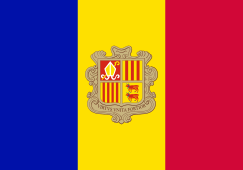

.svg.png)
















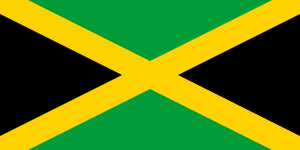







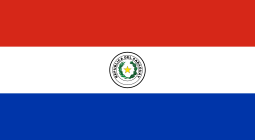










Non UN-member states and UN observer states
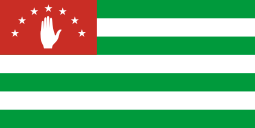
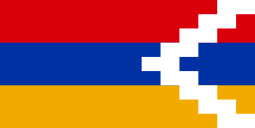
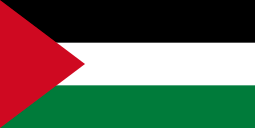
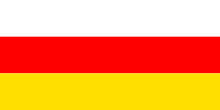
Regional governments
.svg.png)
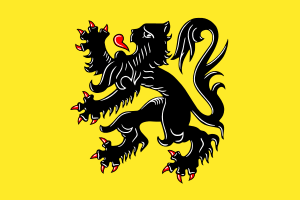

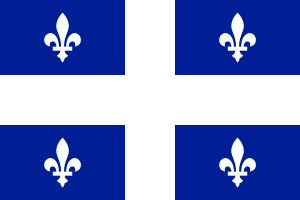

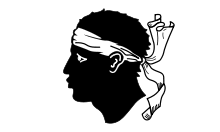



.svg.png)
See also
References
- ↑ Badcock, James; Crisp, James (10 October 2017). "Catalan leader puts declaration of independence on hold to allow time for talks". Telegraph.co.uk. Retrieved 12 October 2017.
- 1 2 "Catalan President Signs Declaration Of Independence, But Will Seek Talks With Madrid". huffingtonpost.co.uk. 10 October 2017. Retrieved 12 October 2017.
- ↑ "Catalan leader signs declaration document". euronews.com. 10 October 2017. Retrieved 12 October 2017.
- ↑ Jones, Sam; Burgen, Stephen; Graham-Harrison, Emma (28 October 2017). "Spain dissolves Catalan parliament and calls fresh elections". The Guardian.
- ↑ Alandete, David (27 October 2017). "Análisis | Is Catalonia independent?". El País.
- 1 2 Piñol, Pere Ríos, Àngels (27 October 2017). "El Parlament de Cataluña aprueba la resolución para declarar la independencia". El País (in Spanish).
- ↑ "Spanish PM dissolves Catalan parliament". BBC News. 27 October 2017.
- ↑ "Declaración de Independencia Cataluña: Rajoy delega en Soraya Sáenz de Santamaría la Presidencia de la Generalitat". El Mundo. 2017-10-25. Retrieved 2017-10-29.
- ↑ "Catalonia leader: "We're going to declare independence 48 hours after official results are counted"". youtube.com. 4 October 2017. Retrieved 13 October 2017.
- ↑ "Final tally of the referendum: 90,18% Yes votes on a 43% turnout". ara.cat. 6 October 2017. Retrieved 13 October 2017.
- ↑ Minder, Raphael; Kingsley, Patrick (10 October 2017). "In Catalonia, a Declaration of Independence From Spain (Sort of)". Nytimes.com. Retrieved 12 October 2017.
- ↑ País, El (11 October 2017). "¿Ha declarado Puigdemont la independencia?". elpais.com. Retrieved 12 October 2017.
- ↑ "Puigdemont declara la independencia de Cataluña pero la deja en suspenso para abrir un periodo de diálogo". larazon.es. Retrieved 12 October 2017.
- ↑ Baquero, Miquel Noguer, Camilo S. (11 October 2017). "Puigdemont prolonga la tensión con una secesión en diferido". elpais.com. Retrieved 12 October 2017.
- ↑ Jones, Sam (10 October 2017). "Catalan government suspends declaration of independence". Theguardian.com. Retrieved 12 October 2017.
- ↑ CNN, Ray Sanchez and Natalie Gallón,. "Catalonia's president delays split from Spain". cnn.com. Retrieved 12 October 2017.
- ↑ "Puigdemont postpones declaration of independence to make a final offer of dialogue to Spain". ara.cat. Retrieved 12 October 2017.
- ↑ "Forcadell and Junqueras sign the proposal of declaration of independence (in Catalan)". youtube.com. Retrieved 14 October 2017.
- ↑ "JxSí and the CUP sign the proposal of declaration of independence (in Catalan)". ara.cat. Retrieved 14 October 2017.
- ↑ "Minister of Justice gives no validity to Puigdemont's "non-declaration of independence"". antena3.com. Retrieved 14 October 2017.
- ↑ "Spain asks Catalonia: did you declare independence or not?". nytimes.com. Retrieved 14 October 2017.
- ↑ "Dastis afirma que Puigdemont no declaró la independencia de Cataluña porque "no se hizo en un pleno"". laSexta (in Spanish). EFE. 12 October 2017.
- ↑ "Catalan independence crisis escalates". BBC News. 27 October 2017.
- ↑ "Catalan Parliament Votes for Independence From Spain". NBC4 Washington.
- ↑ "El independentismo supera la mayoría absoluta pero no alcanza el 50% de los votos". Eldiario.es. Retrieved 30 October 2017.
- ↑ "Forcadell desconvoca la reunión de la Mesa del martes porque el Parlament "se ha disuelto"". La Vanguardia (in Spanish). 30 October 2017. Retrieved 30 October 2017.
- 1 2 Cortizo, Gonzalo (30 October 2017). "Puigdemont y parte de su gobierno se refugian en Bélgica para evitar a la justicia española". eldiario.es (in Spanish). Retrieved 30 October 2017.
- ↑ "Catalan leader Carles Puigdemont has fled the country amid rebellion charges". The Independent. Brussels. 30 October 2017. Retrieved 4 November 2017.
- 1 2 Guindal, Carlota (30 October 2017). "La Fiscalía se querella contra Puigdemont y el Govern por rebelión y sedición". La Vanguardia (in Spanish). Retrieved 30 October 2017.
- 1 2 Jones, Sam (30 October 2017). "Spanish prosecutor calls for rebellion charges against Catalan leaders". The Guardian. Barcelona. Retrieved 30 October 2017.
- ↑ Tadeo, Maria; Strauss, Marine; Duarte, Esteban (30 October 2017). "Catalonia Bows to Spanish Authority as Rajoy's Strategy Prevails". Bloomberg. Retrieved 30 October 2017.
- 1 2 "Work resumes normally in Catalonia as Spain enforces direct rule". Barcelona, Madrid. Reuters. 30 October 2017. Retrieved 30 October 2017.
- ↑ "Suspendida la declaración de independencia de Cataluña". www.huffingtonpost.es. 31 October 2017.
- ↑ "Catalan ex-ministers held by Spain court". BBC News. 2 November 2017.
- ↑ Jones, Sam (2 November 2017). "Spanish judge jails eight members of former Catalan government". The Guardian.
- ↑ "Separatist parties in Spain's Catalonia win majority in election". CNN. 22 December 2017.
- ↑ "Spanish Judge Jails 5 Catalan Leaders in a Blow to Secessionist Movement". 23 March 2018.
- ↑ "Catalan president Puigdemont detained in Germany, sparking massive protests". Daily Sabah. 25 March 2018.
- ↑ "Germany refuses to extradite Catalonia's Puigdemont on rebellion charges". Independent. 5 April 2018.
- ↑ "Puigdemont Cannot Be Extradited on Rebellion Charge, German Court Rules". New York Times. 5 April 2018.
- ↑ "Abkhazia is ready to consider recognizing the independence of Catalonia". rusreality.com. 27 October 2017. Retrieved 28 October 2017.
- ↑ "South Ossetia Ready to Consider Recognition of Catalonia's Independence – FM". Sputnik. 28 October 2017. Retrieved 28 October 2017.
- ↑ Tusk, Donald (27 October 2017). "For EU nothing changes. Spain remains our only interlocutor. I hope the Spanish government favours force of argument, not argument of force". @eucopresident. Retrieved 28 October 2017.
- ↑ "European Parliament President statement on the situation in Catalonia | The President | European Parliament". europarl.europa.eu. Brussels. 27 October 2017. Retrieved 28 October 2017.
- ↑ "UN calls for resolving Catalonia crisis within framework of Spanish constitution". Tass.com. 27 October 2017. Retrieved 28 October 2017.
- ↑ "China supports Spanish unity amid Catalan independence declaration". Xinhua. Retrieved 1 November 2017.
- ↑ "Catalogne : Emmanuel Macron apporte son "plein soutien" à Mariano Rajoy (Europe1)". 27 October 2017.
- ↑ "Позиция Москвы по вопросу Каталонии осталась неизменной". 27 October 2017.
- ↑ "Statement on the Unilateral Declaration of Independence made by the Catalan regional parliament". Retrieved 2017-10-27.
- ↑ Smith-Spark, Laura; Rebaza, Claudia (27 October 2017). "Catalonia votes to declare split from Spain". CNN.
- ↑ "El Govern considera que Catalunya continua essent una part integrant d'Espanya i apel·la al diàleg per resoldre la situació". 27 October 2017.
- ↑ "Argentina y la situación en Cataluña II". Mrecic.gov.ar. 27 October 2017.
- ↑ "Official witter account of Charles Michel". Twitter.com. 27 October 2017. Retrieved 30 October 2017.
- ↑ "Brasil rejeita declaração de independência da Catalunha e pede diálogo". 28 October 2017.
- ↑ "Позиция на МВнР: България подкрепя териториалната цялост на Испания". Mfa.bg. 27 October 2017.
- ↑ "Catalonia independence: Trudeau says Canada recognizes one united Spain". CBC. 27 October 2017.
- ↑ "Twitter account of the Foreign Minister of Chile". Twitter.com. 27 October 2017. Retrieved 30 October 2017.
- ↑ ""Al mundo le conviene una España unida": Santos sobre la independencia de Cataluña". Elpais.com.co. 27 October 2017.
- ↑ "MVEP: Događaji u Kataloniji su unutarnje pitanje Španjolske". vijesti.hrt.hr (in Croatian). Croatian Radiotelevision. 28 October 2017. Retrieved 2017-10-29.
- ↑ "Comunicado Oficial: Ecuador ante la situación en Cataluña". 27 October 2017.
- ↑ Ratas, Jüri (27 October 2017). "Estonia supports the territorial integrity and unity of Spain. Internal affairs must be solved according to their constitution and laws". @ratasjuri. Retrieved 27 October 2017.
- ↑ "Seibert: Sorge über erneuten Verfassungsbruch". Retrieved 2017-10-27.
- ↑ "Georgia fully supports the sovereignty and territorial integrity of the Kingdom of Spain and stands in solidarity W/ the Spanish Government". Retrieved 27 October 2017.
- ↑ "The declaration of Catalonian independence is a matter of Spanish internal affairs". Retrieved 2017-10-30.
- ↑ "India says #Catalonia should address issues of identity and culture within #Spain's constitutional framework & respect national integrity". 28 October 2017. Retrieved 30 October 2017.
- ↑ "Kementerian Luar Negeri Indonesia". Twitter.com. Retrieved 30 October 2017.
- ↑ Hennessy, Michelle. "The Irish government says it does not recognise Catalan independence". Thejournal.ie. Retrieved 30 October 2017.
- ↑ "El ministro de Exteriores italiano asegura que Italia "no reconoce ni reconocerá" la DUI". eldiario.es (in Spanish). 27 October 2017. Retrieved 28 October 2017.
- ↑ "Israel refuses to support Spain against Catalan independence". Arutz Sheva. 31 October 2017. Retrieved 31 October 2017.
- ↑ "Israel definitively refuses to give way to Spain's diplomatic pressure". Retrieved 2 November 2017.
- ↑ "Foreign Ministry Issues First Statement on Catalonia Crisis". hamodia.com. Hamodia. Retrieved 6 November 2017.
- ↑ "El ministro de Exteriores italiano asegura que Italia "no reconoce ni reconocerá" la DUI". rjrnewsonline.com. 12 November 2017. Retrieved 12 November 2017.
- ↑ ""Japón ante el 155". Retrieved 2017-11-24.
- ↑ ""BNS Lithuania". Retrieved 2017-10-27.
- ↑ "Malaysia does not recognise Catalan independence". The Star. MSN. 1 November 2017. Archived from the original on 1 November 2017. Retrieved 1 November 2017.
- ↑ "Malta refuses to recognise Catalan independence". 28 October 2017.
- ↑ "Morocco rejects the unilateral process of the independence of Catalonia, and expresses its attachment to Spain sovereignty and territorial integrity". Retrieved 2017-10-28.
- ↑ "Cuenta oficial de Twitter de Enrique Peña Nieto". 27 October 2017.
- ↑ MFA, Norway (2017-10-27). "FM #Eriksen Søreide:Norway will not recognize unilateral declaration of Independence #Catalonia. Re-establish legality as basis for dialogue". @NorwayMFA (in Romanian). Retrieved 2017-12-05.
- ↑ "Comunicado de Prensa del Ministerio de Asuntos Exteriores de Paraguay". 27 October 2017.
- ↑ "Comunicado sobre la situación en Cataluña de la Cancillería del Perú". 27 October 2017.
- ↑ "MFA statement on developments in Catalonia". Retrieved 2017-10-27.
- ↑ "Governo de portugal". Governo de portugal (in Portuguese). Retrieved 2017-10-28.
- ↑ "Romania reaffirms support for Spain's territorial integrity". Xinhua. 28 October 2017. Retrieved 28 October 2017.
- ↑ "Дачић: Исти је пут Косова и Каталоније" [Dačić: Catalonia's path is the same as Kosovo's]. RTS (in Serbian). 27 October 2017. Retrieved 28 October 2017.
- ↑ "FOTO: Katalonski premier vztraja pri neodvisnosti in ljudi poziva k mirnemu uporu" [Catalonian premier insists at independence, and calls for people to rebel peacefully]. 24ur (in Slovene). 2017-10-28. Retrieved 30 October 2017.
- ↑ "Sri Lanka rejects declaration of independence by Catalonia". 27 October 2017.
- ↑ "Katalunya'daki Gelişmelerle İlgili İkaz Duyurusu". 27 October 2017. Retrieved 28 October 2017.
- ↑ Klimkin, Pavlo (27 October 2017). "Ukraine supports the state sovereignty and territorial integrity of Spain within its internationally recognized borders". @PavloKlimkin. Retrieved 28 October 2017.
- ↑ Giap, Trong (31 October 2017). "Việt Nam lên tiếng về khủng hoảng chính trị Tây Ban Nha". VnExpress (in Vietnamese). Retrieved 31 October 2017.
- ↑ "Abkhazia is ready to consider recognizing the independence of Catalonia". rusreality.com. 27 October 2017. Retrieved 28 October 2017.
- ↑ "Comment by the Information and Public Relations Department of the Artsakh Foreign Ministry on the Declaration of Independence of Catalonia – MFA NKR". nkr.am. Retrieved 28 October 2017.
- ↑ "Palestina apoya una "España fuerte y unida" y apuesta por el diálogo" (in Spanish). 30 October 2017. Retrieved 4 November 2017.
- ↑ "South Ossetia Ready to Consider Recognition of Catalonia's Independence – FM". Sputnik. 28 October 2017. Retrieved 28 October 2017.
- ↑ "Taiwan hopes for peaceful resolution of Catalonia issue: MOFA". ocac.gov.tw. 28 October 2017. Retrieved 29 October 2017.
- ↑ NWS, VRT (27 October 2017). "Liveblog: Catalonië onafhankelijk: uren van blijdschap, verwarring en spanning".
- ↑ "Quebec reacts to violence during Catalan independence vote". CBC News. 1 October 2017. Retrieved 3 March 2018.
- ↑ "Quebec passes unanimous motion condemning Spain's 'authoritarianism' over Catalonia". Global News. The Canadian Press. 4 October 2017. Retrieved 3 March 2018.
- ↑ "Le président de l'Assemblée de Corse reconnaît l'indépendance de la Catalogne". 27 October 2017.
- ↑ Catalogna: amministratori sardi riconoscono indipendenza, Cagliaripad.it
- ↑ Sardegna. Amministratori indipendentisti uniti a sostegno della Repubblica Catalana, Sardegna e Libertà
- ↑ "Statement on Catalonia". Scottish Government News. Retrieved 30 October 2017.
- ↑ Jones, Carwyn (27 October 2017). "Picture". Twitter.com. Retrieved 30 October 2017.